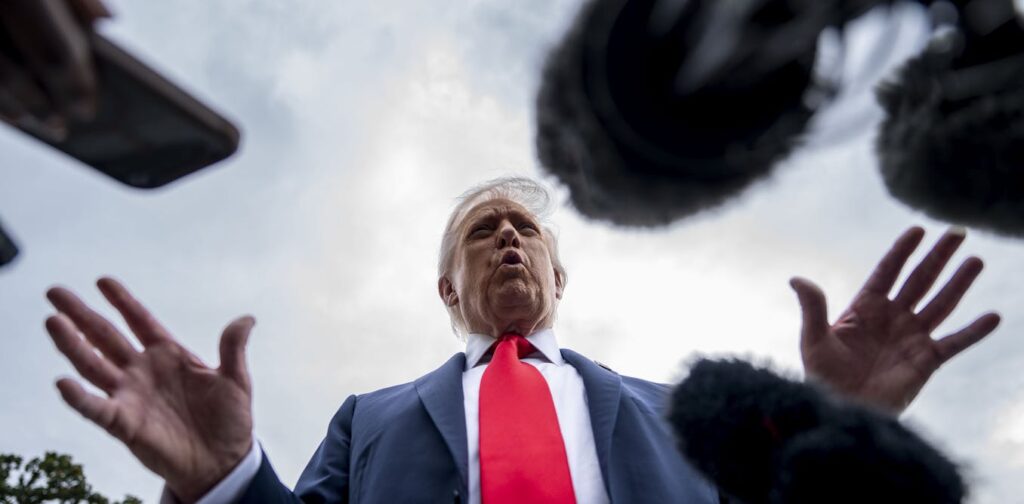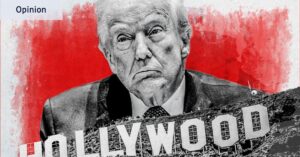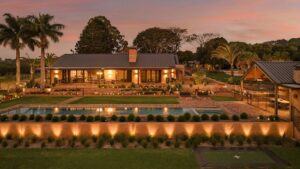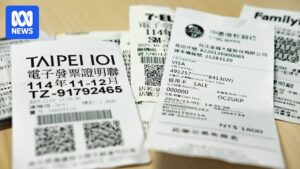
In a fiery exchange that underscores the often contentious relationship between former U.S. President Donald Trump and the media, Trump accused ABC journalist John Lyons of “hurting Australia” during a press interaction in Washington. The confrontation arose when Lyons, the ABC’s United States correspondent, pressed Trump on his business dealings while in office, a topic that has frequently drawn scrutiny.
Lyons was gathering information for an upcoming episode of ABC’s investigative program, Four Corners. He questioned Trump about the increase in his wealth since assuming the presidency and the appropriateness of his ongoing business activities. Trump responded by asserting that his children manage the business and that most deals were completed before his presidency began.
When Lyons identified himself as being from the Australian Broadcasting Corporation, Trump retorted, “In my opinion, you are hurting Australia very much right now. And they want to get along with me. You know, your leader is coming over to see me very soon. I’m going to tell him about you. You set a very bad tone.” Lyons attempted to continue, but Trump silenced him with a curt “Quiet.”
White House Reaction and Diplomatic Implications
The White House amplified Trump’s remarks with a post on its official response account, labeling Lyons a “rude foreign Fake News loser” and reiterating the president’s command to “Quiet.” This interaction comes ahead of a significant diplomatic meeting between Trump and Australian Prime Minister Anthony Albanese, scheduled to occur on the sidelines of the United Nations leaders’ week.
The meeting, eagerly anticipated by the Albanese government, represents a critical opportunity to strengthen U.S.-Australia relations. However, Trump’s comments and the upcoming Four Corners program could serve as potential diplomatic irritants.
Australia’s Defense Spending and Strategic Concerns
The Albanese administration has been working to address U.S. concerns over Australia’s defense spending, which currently stands at about 2% of GDP. The U.S. has been urging Australia to increase this to 3.5%. In response, the Australian government recently announced a $12 billion investment over the next decade in a naval facility in Western Australia.
Defense Minister Richard Marles has countered the criticism by highlighting alternative metrics. “There are different measures around the world of percentages of GDP. I mean, if you look at the way in which NATO accounts for its own spending in terms of percentage of GDP, based on that metric, our spending on GDP today in terms of defense is around 2.8%,” Marles stated.
Media Freedom and International Relations
The incident with Lyons highlights ongoing tensions between Trump and the press, particularly foreign journalists. The ABC defended Lyons, emphasizing his credentials and the importance of journalistic inquiry. “John Lyons is a highly awarded journalist and one of the most experienced and respected reporters in Australia. His job is to ask questions. He has the ABC’s full support,” the network declared.
The forthcoming meeting between Trump and Albanese will be closely watched, not only for its diplomatic outcomes but also for its handling of media relations and the potential impact of the Four Corners broadcast. As both nations navigate complex geopolitical landscapes, the interplay between media freedom and international diplomacy remains a crucial element of their bilateral relationship.
As the world observes these developments, the role of journalism in holding power to account continues to be a pivotal factor in shaping public discourse and policy. The outcome of the Trump-Albanese meeting could set the tone for future interactions between the two countries, with implications for defense, trade, and media freedom.






